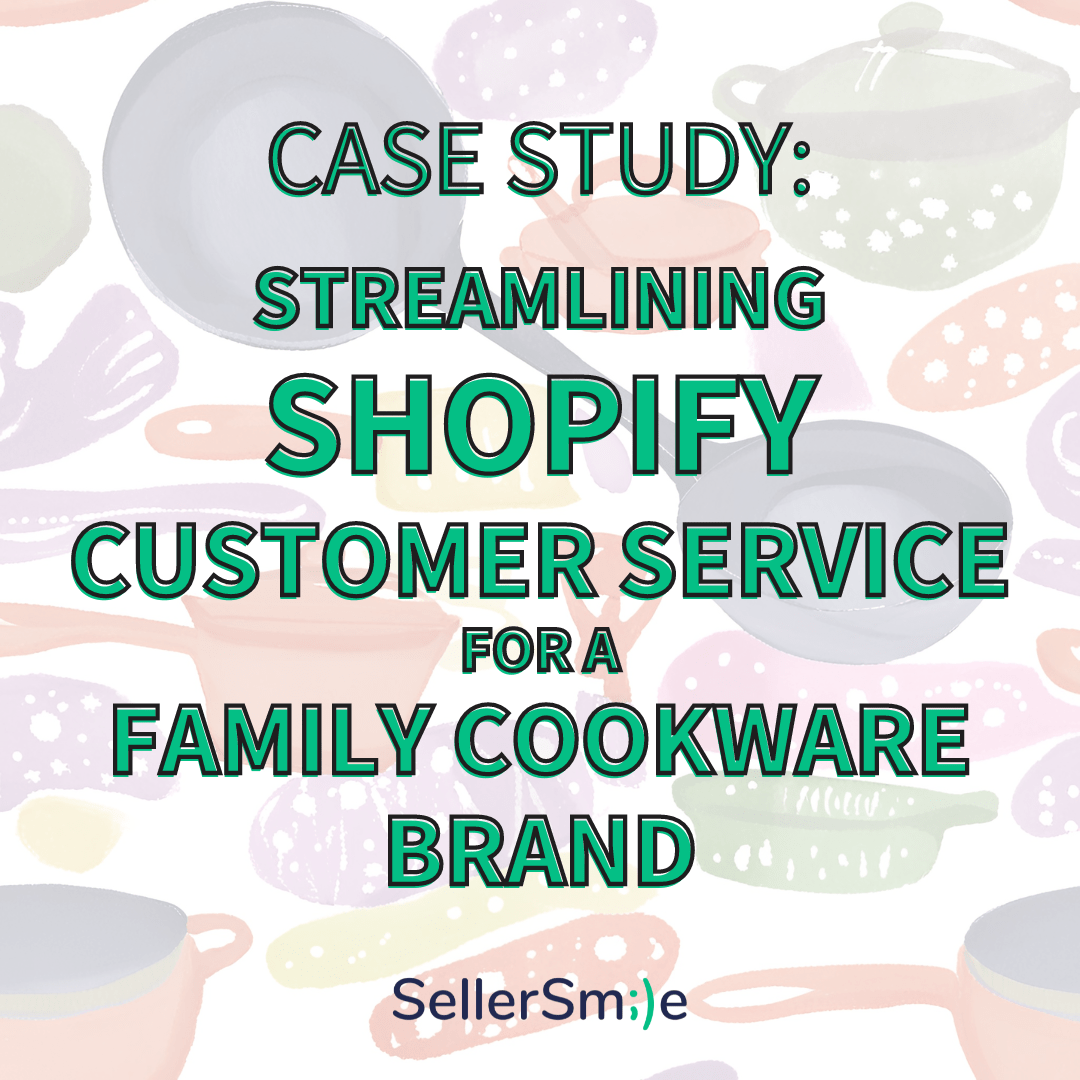Hey there! This is an article about outsourcing your Shopify store’s customer support. If you’re looking to contact Shopify themselves or Shopify’s Customer Service, you may contact them by calling 1 (855) 816-3857 or by visiting Shopify.com/Contact.
Success on Shopify can lead to overwhelm
Congratulations! You’re selling products online and you’ve started ramping up. Maybe you’ve launched your Shopify store and your site is really taking off, getting more traffic and sales and customer support emails coming in 24 hours a day, 7 days per week. You’ve just installed a new chatbot and you might even be taking customer phone calls, but increasing sales across multiple channels keeps you pinned to your laptop doing your customer service, chatting with shoppers, putting out fires and fixing everything else.
This is a common situation; success can lead to being overworked and overwhelmed due to customer service. A growing business will generate more customer service emails, social media comments, public reviews, etc., and if your team isn’t assembled, prepared, or optimized, your customers will be the first to let you know.
When it gets really bad, a backlog of emails piles up. Your customers might be left waiting for weeks, become too frustrated and demand their money back while leaving you a negative review on the way out. When an experience like this is posted in a public forum, especially if it happens more than occasionally, it could cause shoppers to second-guess their purchase from your store.
Take a look at this real customer comment from a seller that had a backlog of customer tickets over the holiday shopping season, the customer waited too long for a resolution so they canceled their purchase:

In the era of Amazon and heated competition for positive product reviews, a single customer has never had so much power and influence. For the most part, these public comments and reviews can be perceived as a reflection of the type of company you’re running. Your brand’s reputation is at stake.
Doing customer service right, especially on Shopify, is a prerequisite to success in the new era of e-commerce. Don’t let growth and the added customer support that follows stifle your dreams of owning a successful e-commerce business!
Customer support is critical and filled with opportunity
Customer service is an unavoidable consequence of having customers. Some sellers may even feel resentment towards it. You might envision a lot of time spent typing the same basic message over and over, seeing repeated disappointments or long, hostile messages. We do, in fact, work with sellers that receive many “happy” emails, but in general, satisfied customers reach out less than dissatisfied ones.
Amidst the turmoil, we see customer service as the front lines of your company, it’s the place where your site and your products are in direct contact with the world. It can get messy, but in reality, it’s a massive opportunity! Mike McDerment, the Founder and CEO of Freshbooks described how all new hires in the company, even executives, work in customer service at first in order to see and feel customers’ interaction to their product. Empathy for your customer can reap myriad benefits for your business.
Over the years, managing customer service for dozens of sellers, we’ve learned that the customer service team is in a unique position to spin the flywheel of growth by winning positive reviews, converting browsing shoppers, and sourcing ideas for new content and product developments. One of the best ways to win a positive product review is to deliver unexpectedly fast and friendly service. Good customer service is not easy but it’s well worth it when done right. Your dedication to serving customers can become a top feature of your offering.
We see three options for sellers when it comes to managing their online customer support. They must either, 1) do it themselves, 2) delegate it, or 3) automate it (maybe in the near future with the use of AI-enabled bots). Since Amazon sets most expectations surrounding e-commerce today, and since they expect 3rd party sellers to reply to all customer service messages within 24 hours, seven days per week (Amazon Contact Response Time), we recommend you delegate your customer service, and not only to an individual but to an entire team.
You may choose to build your own team one-by-one or offload it all at once to an existing team that is professional and reliable.
Outsource your Shopify customer service
If your Shopify store looks beautiful and functions well, you’re bound to have fewer headaches and earn more revenue. Good things really do happen to good people! Likewise, treat your customers well by being responsive, comprehensive, and generous, and they’ll reciprocate the good back to you.
However, if you don’t have the bandwidth to offer high-touch customer support, or maybe you just don’t know how to do it well, start thinking about ways to put your customer service in the hands of someone else, preferably a group of people that will treat your customers as good, if not better than you!
A team is stronger than the sum of its members:
“Teamwork is the ability to work together toward a common vision. The ability to direct individual accomplishments toward organizational objectives. It is the fuel that allows common people to attain uncommon results.” -Andrew Carnegie
Similar to the rise of personal websites and WordPress, the rise of e-commerce and the popularity of Shopify has spawned an entire industry of freelancers and agencies that serve its users. We started SellerSmile to help third-party Amazon sellers deliver better customer service but it wasn’t long before we started helping with sellers’ Shopify store customer service emails too.
At some point, your business will grow to the size where customer emails will start to seriously distract you from other high value and high importance tasks. It will disrupt holidays, events, and even your days off. One of the largest volume accounts we work with typically generates 1-3 hours of work for our optimized and highly-trained customer service team, and that’s 365 days of the year! It’s never too early to delegate or outsource it to avoid that heavy, consistent workload.
The best candidates for your customer service team are people with a lot of energy and empathy. These people cringe when they see someone else’s pain. They like to organize and rearrange things, they care about the minutia. Your ideal customer support team will be a collection of these bright and tech-savvy people that can see the big picture and use a concert of software, all while bringing a kind heart to the situation.
While we recommend business owners do their own customer service, at least at the beginning to get an adequate understanding of it, delegating it to a complete team with more time and/or talent will help your business scale while keeping you and the rest of your company happy.
Who will be your customer service team?
There are several options when it comes to outsourcing your Shopify customer service and they range on scales of cost, expertise, and professionalism:
- Ask family members or friends to help.
- Hire W-2 employees.
- Hire 1099 freelancers/contractors [ FreeeUp ].
- Hire a customer service agency like SellerSmile [ Schedule a call ].
Shopify features a native hiring platform (Shopify Experts Directory) but it doesn’t seem to have customer service experts yet.
No matter what, due to the daily commitment it takes and because customer service may be a relatively lower-value task compared to other business activities, we recommend sellers to delegate customer service as soon as possible and then build a well-rounded team fast to spread the responsibilities.
How you choose to build your customer service team will depend on your unique needs, preferences, and resources, but we see it as the first step to scaling your business and removing the owner or business manager as the bottleneck.
Strong customer service for your Shopify store is important
In an article published by Forbes.com, contributor Micah Solomon frames customer service the way we do; it’s a powerful way to increase sales and grow your business.
Be fast!
Keep response times under 24 hours, 7 days per week. Have your team scheduled in overlapping coverage and share the workload among several agents. The easiest way to impress a customer is to reply faster than expected.
Measure What Matters
Customer service matters, alot! How will you know how “good” your team is, or if they’re getting better?
John Doerr’s book, “Measure What Matters: How Google, Bono, and the Gates Foundation Rock the World with OKRs.” is the backbone of SellerSmile’s goal-setting strategy. We measure and review the areas we want to improve every quarter.
A few key metrics to track for your customer service team are first contact resolution rate and especially first reply time. Revisit your customer service metrics often and never stop thinking about ways to improve them in a way that makes it better for your customers.
Mirror Amazon’s policies on Shopify
Since Amazon is the gold standard, we recommend as a general customer service strategy to mirror as many of Amazon’s policies as feasible. Think about it, you’ll be emulating one of the most customer-centric companies in the world!
Mirroring Amazon policies will be how your Shopify store will compete with the best offerings in e-commerce. Have the same return window, offer free two-day or less shipping, or provide hassle-free returns with prepaid shipping labels. The added benefit of mimicking Amazon’s model is that shoppers browsing on your Shopify store will feel more consistency when they view your Amazon store, which should reduce unnecessary customer inquiries and lead to greater sales.
If you’d like to read more about “selling like Amazon”, we recently wrote an article about how to use Shopify and Amazon together to build and protect your brand.
If you haven’t started selling on Amazon yet, now’s the time, open your selling account on Amazon, a professional plan costs $40/month + selling fees.
Integrate your customer service team into your Shopify account
After your customer service team is assembled, it’s time to introduce them to your Shopify site.
First, invite your entire team to have limited access to your Shopify store by creating Shopify staff accounts. Limited access will keep sensitive details of your business safe while permitting the appropriate permissions for your team to keep your customers happy.
Second, document your standard operating procedures in Shopify. Any platform has unique ways to perform common tasks such as looking up the details of an order, issuing a refund, etc. Have your entire team go through a handful of various support emails to learn the platform together. During these initial training sessions, open a document and record the steps necessary to complete some of the most basic functions for your business. If your team is remote, designate a leader for the meeting that will share their screen while the rest of the customer service team is able to focus, take notes and ask questions.
Be detailed with your notes and refine them periodically. Make notes easily accessible. A comprehensive document for your customer service team provides everything needed to manage your customers and it’s an invaluable training tool. In your document, include contact information for those individuals that need to be alerted in the case of an escalation or an urgent situation. Our team uses Slack to communicate and a master Google Doc for each account we work with.
You’ll start to develop and customize the customer experience on your Shopify store simply by documenting and then implementing the steps outlined in your document. Once you’ve covered most situations and procedures, you’re almost ready to step away from your customer service and continue growing!
Next, grant your team access to all third-party platforms and software tools needed to do your customer service. Common platforms we use in conjunction with Shopify are PayPal to issue refunds, shipping accounts like UPS or FedEx to generate shipping labels, and other 3PL systems.
Last, after your team has been granted access to everything necessary, create a work schedule and put it on a calendar (we use Google Calendar). Which customer service agents will be working on which days? Scheduling shifts will allow your team members to rest, while others cover those responsibilities.
At SellerSmile, we prefer to train at least three agents per account and schedule them in overlapping shifts, which allows us to offer continuous customer service seven days per week while still treating our team well. In our experience, a happy customer service team creates happy customers.
Consider time zone differences if your team is distributed. Add enough help to your team and spread out the coverage so everyone can share the load and no one feels unfairly overloaded.
Once you’ve reached this point, you’ve done it, you’ve outsourced your Shopify customer service!
Review
Selling your products on your Shopify store is a critical e-commerce strategy that can overwhelm a business owner.
Consider outsourcing your Shopify customer service to a team that can do an excellent job for you and your customers.
Offering fast and excellent customer experience seven days per week is the new benchmark. Last, sell like the best and be like Amazon.
Want to explore outsourcing your Shopify customer service with SellerSmile? Submit your application to receive an estimate today!




